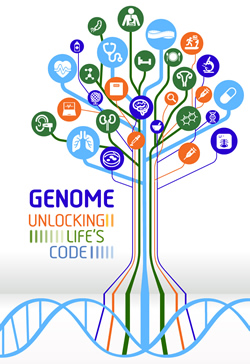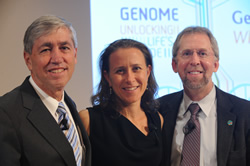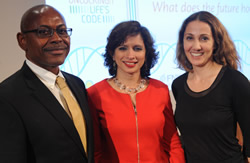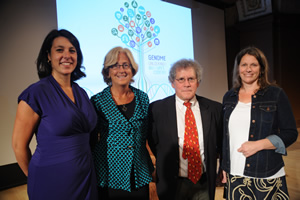Last updated: October 20, 2014
Genome: Unlocking Life's Code closing symposium features genomics, global health and the future
Genome: Unlocking Life's Code closing symposium features genomics, global health and the future
Event at Smithsonian National Museum of Natural History celebrates exhibition collaboration
By Raymond MacDougall
Associate Director of Communications, Division of Intramural Research
 Fans of Genome: Unlocking Life's Code, an innovative, interactive and mobile museum exhibition created by the National Human Genome Research Institute (NHGRI) and the Smithsonian National Museum of Natural History (NMNH), assembled at NMNH's Baird Auditorium on Sept. 30, 2014, for a celebratory symposium. "Genomics and Global Health: What does the Future Hold?" served as the closing event for the exhibition in Washington, D.C. It also hailed the exhibition's opening at the Reuben H. Fleet Science Center in San Diego, the first of a series of museums the exhibition is scheduled to visit throughout North America over the next 4-5 years.
Fans of Genome: Unlocking Life's Code, an innovative, interactive and mobile museum exhibition created by the National Human Genome Research Institute (NHGRI) and the Smithsonian National Museum of Natural History (NMNH), assembled at NMNH's Baird Auditorium on Sept. 30, 2014, for a celebratory symposium. "Genomics and Global Health: What does the Future Hold?" served as the closing event for the exhibition in Washington, D.C. It also hailed the exhibition's opening at the Reuben H. Fleet Science Center in San Diego, the first of a series of museums the exhibition is scheduled to visit throughout North America over the next 4-5 years.
During the multi-session symposium, NHGRI's Education and Community Involvement Branch presented three armchair conversations. The first group included Anne Wojcicki, chief executive officer and co-founder of the personal genetic testing company 23andMe, and Richard Lifton, M.D., Ph.D., Sterling Professor of Genetics and Yale University professor of medicine. NHGRI Director Eric Green, M.D., Ph.D., moderated the discussion, which explored the future of genomics, specifically the roles to be played by private citizens in genetic testing and research, access to genomic medicine and clinical practices.
 |
"Genomics is finding its way into public life on a daily basis and is becoming a part of public dialog," said Dr. Green in his welcoming remarks." "The word genomics is going to be part of the lexicon in the communications between patients and healthcare providers."
"There is nothing more exciting than following science and watching it progress," said Ms. Wojcicki. She related principles that guide her company's compact with genetic test subscribers, saying, "At some point, genetic information is going to be free. You should be able to explore it. Average people can be empowered to understand it."
Dr. Lifton cited promising genomic technologies that will improve scientists' understanding of biology and eventually create a path toward improved therapies. Declining government investment in research is poorly timed, considering that genomics is poised to make its greatest impact, he said.
A second panel discussed the use of genomics to find cures and treatments for diseases that affect populations around the world. Moderating the session was Seema Kumar, vice president of innovation, global health and policy communications at Johnson & Johnson, a sponsor for the symposium. She directed questions to Pardis Sabeti, M.D., Ph.D., associate professor, Center for Systems Biology at Harvard University, and senior associate member of the Broad Institute of Harvard and Massachusetts Institute of Technology, and to Charles Rotimi, Ph.D., director of the NIH Center for Research on Genomics and Global Health.
 |
Dr. Sabeti, whose laboratory gained recent attention for a genome sequencing study of Ebola virus isolates, talked about her research team's efforts to establish a network of disease surveillance laboratories in various African countries prior to the Ebola outbreak.
"Genomic surveillance, in coordination with other Nigerian efforts, has been able to contain it," she said of the Ebola outbreak, which she described as being halted in Nigeria and Senegal.
Tragically, five of Dr. Sabeti's collaborators succumbed to Ebola. Yet, she conveyed a hopeful message about the unprecedented crisis, saying, "We have a tool in our toolkit that microbes don't have, which is the ability to look at the genome and understand how it works."
Dr. Rotimi described his research efforts on health disparities in people who trace their ancestry to Africa, including a preventable condition called podoconiosis. At risk are Ethiopian farmers who are genetically susceptible to inflammation triggered by walking barefoot in the volcanic soil. The particulates embed in the skin, which then causes a stigmatizing foot disfigurement. Informing farmers who are genetically predisposed to podoconiosis might help persuade them to wear shoes, said Dr. Rotimi.
The evening portion of the symposium, "A Conversation with Carolyn Hax: Ask Me About Health, Genetics, and Dealing with Disease," provided an opportunity for the audience to ask their questions about genetic testing, complex health decisions, and coping with disease. The panel included Hax, a syndicated advice columnist with the Washington Post, Barbara Biesecker, Ph.D., NHGRI genetic counselor and researcher, and David Valle, M.D., director of the Institute of Genetic Medicine at The Johns Hopkins University School of Medicine in Baltimore. The group responded to numerous audience questions on a range of topics from how to decide what genetic information a person may want to receive, to tips on coping with uncertainty - all from their different vantage points: an advice columnist, a genetic counselor and a physician. The conversation was facilitated by Rebecca Roberts, Smithsonian Associates program coordinator.
 |
"It's asking a lot of people to be able to predict how they react to information," Hax said. "Each person must consider how they might live with the weight of knowledge about a particular genetic result and how good is your prevention information."
Dr. Valle offered the clinical geneticist's perspective on making health decisions based on genetic information. "As genetics and genomics expand, we will see a genetic component in all disease," he said. "We all perceive risk differently. It is the duty of the geneticist or the physician to help people understand the risk as accurately and completely as possible." He added that it is important to provide good information about what an individual can do to stay as healthy as possible.
Dr. Biesecker provided insight on living with uncertainty. Different personalities manage uncertainty differently. Some people are averse to ambiguity, while optimists have a higher tolerance for it. "All of life is uncertain," she said. "It's a genetic counselor's job to get at how people manage and think about uncertainty." On one topic, however, she was certain. "There's no more stimulating scientific career to be in right now. You can't be in genetics today and not be excited," she said.
